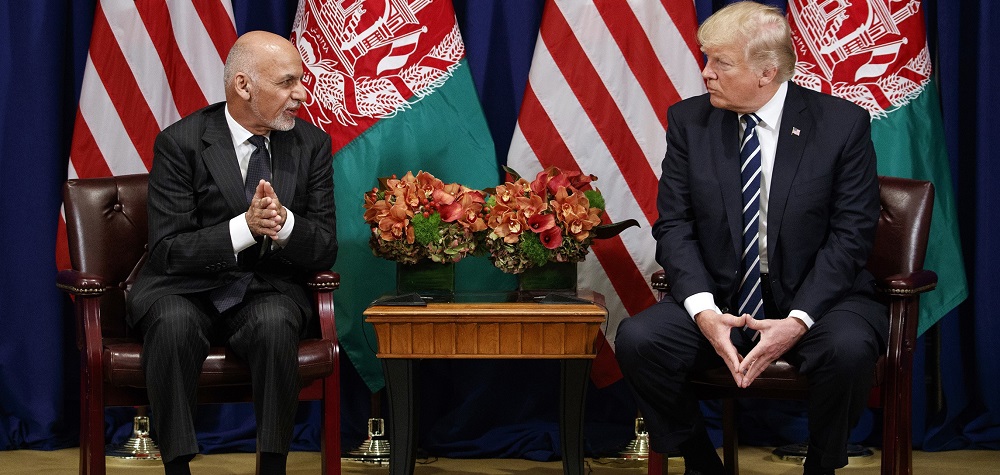Alwaght- The resignation of four political and security officials in the Afghan government on Saturday has become a central issue in Afghanistan politics this week.
The resignations from Defence Minister Tariq Shah Bahrami and Interior Minister Wais Barmak, as well as Masoom Stanekzai, head of the National Directorate of Security, were submitted to President Ashraf Ghani, hours after National Security Adviser Hanif Atmar quit.
According to a statement released by Haroon Chaksneuri, the spokesman to the government, President Ghani has asked three security officials to stay in the posts and “work for the betterment of the security situation,” and only has accepted the resignation of Atmar. The president immediately announced for him a replacement, Hamdullah Mohebi.
Now the important issues taking the attention of the Afghans and also the world are the reasons behind the government members' quitting and the outlook ahead of the Central Asian nation.
Alwaght has interviewed Afghanistan affairs expert Mr Pir Mohammad Molazehi to get an image of what is going on in Afghanistan in relation to the resignations.
Home and foreign factors behind the resignations
Addressing the main reasons which motivated the officials to resign, Mr Molazehi told Alwaght that at the present time the Afghan national unity government is facing an immense crisis having roots in three essential issues. The first issue, he said, is related to an expected new US envoy to Afghanistan. Secretary of State Mike Pompeo is expected to name Zalmay Khalilzad, who previously served as the US ambassador to Iraq and Afghanistan, as a special envoy on Afghanistan.
“Khalilzad enters Afghanistan as an American of Afghan descent. Rumors have gone out that he can be an Afghanistan presidential choice in the future. The arrival of the American-Afghan diplomat has become a source of tensions inside the Afghan administration.”
The second issue, he continued, is the Ghani’s differences with his security team members on two cases: First, Hanif Atmar pressed the president to accept an invitation sent to Kabul by Russia to a peace conference in Moscow attended by the Taliban. But the president and other cabinet officials rejected the offer. Second, Atmar is a Pashtun nationalist with an abundance of security experience as he served in the state’s security services from a young age. At the present time, signs of competition between Ghani and Atmar for the presidential post in the future elections are emerging. “Some evidence shows that Atmar finds himself eligible enough to run for president”, Mr Molazehi added.
He maintained that the third issue is the conflict of ideas of the US and Britain in Afghanistan. “Currently, Atmar appears to be close to the British and also Pakistani views on Afghanistan. Entry to Afghanistan of Zalmay Khalilzad, therefore, does not appeal to the British and the former national security advisor.
Ghani rejected the resignations to control the security situation
Asked about the motivation behind the president’s rejection of the quitting letters, the Iranian expert answered: “The three Afghan officials are fundamentally inconsistent with President Ghani and he aims to eject them from the cabinet. The past months' attacks by the Taliban and ISIS drew severe criticism against the state’s security chiefs. In the eyes of the political body and the public opinion, the presidential palace's exposure to attacks is unacceptable. But President Ghani, taking into consideration some logical calculations, could not accept all of the resignations at once because that will compound the already-deteriorated security conditions. But that does not mean they are not divided or he will not seek their ejection from the body of the government in the future.”
US view influenced Atmar resignation accepting
The Iranian expert did not disregard the US role in Ghani’s agreement with Atmar leaving the post. Upon his quitting, Hamdullah Mohebi took his place and Zalmay Khalilzad was announced to be soon sent to Afghanistan as a special envoy. He maintained that this means that the US-desired people are in posts. “This very much indicates that Ghani is on the US side. With regard to the underground rivalry between Ghani and Atmar, it was natural that the advisor's resignation will be accepted.
13 provinces could be handed over to Taliban
Finally, Mr Molazehi touched on the outlook of the Afghanistan situation with regard to the recent developments and the wave of resignations, saying we have to take into account the fact that the US President Donald Trump’s plans in Afghanistan are being implemented. Washington's pressures on Pakistan are yielding fruits as Islamabad appears to have relatively reduced help to the Taliban and Haqqani Network, also a rebel group.
“On the other side, Russia has launched its initiative for peace in Afghanistan, which does not please the US. Washington rejected a Russian invitation to a peace conference. This automatically affected Kabul's turning down the invitation. All in all, it seems that the Americans are running a plan in Afghanistan.”
In late July, the US representatives met with Taliban negotiators in Qatar. At the meeting, a proposal, seemingly American, was raised, considering handing over to the militant group 13 Afghan wilayats and also engaging it in a power-sharing government.
“What we can see is that there is a plan that seeks to deliver to the Taliban part of the power in return for putting down the arms and ceasing attacks. But even if peace with the Taliban is materialized, security conditions will not improve because the country is home to over 20 other fundamentalist groups, including ISIS. If such a concession is made to the Taliban, an expected threat is that other ethnic groups can raise demands for similar privileges, something opening the door for a debate on constitutional reforms to pave the way for a federal system,” the expert concluded.



























